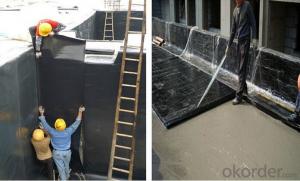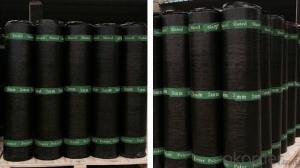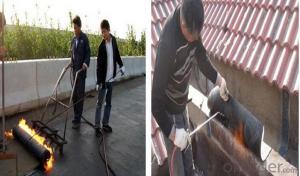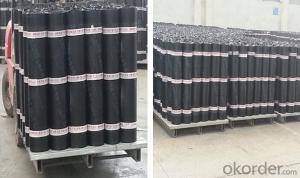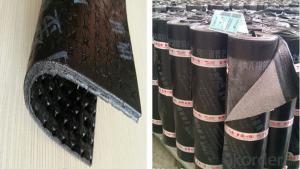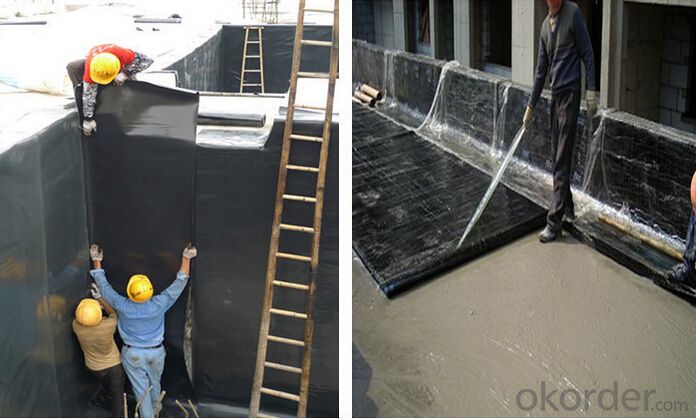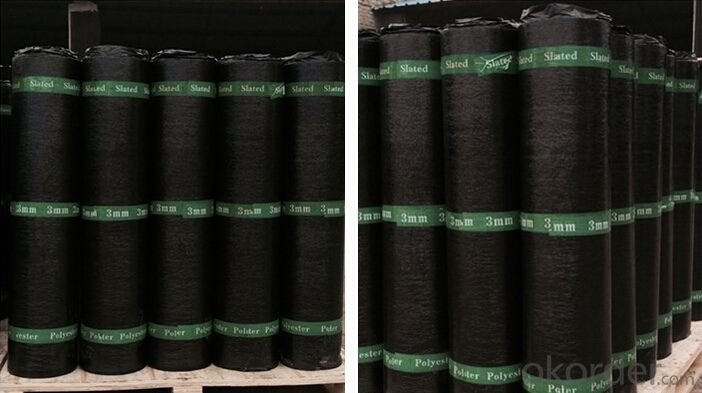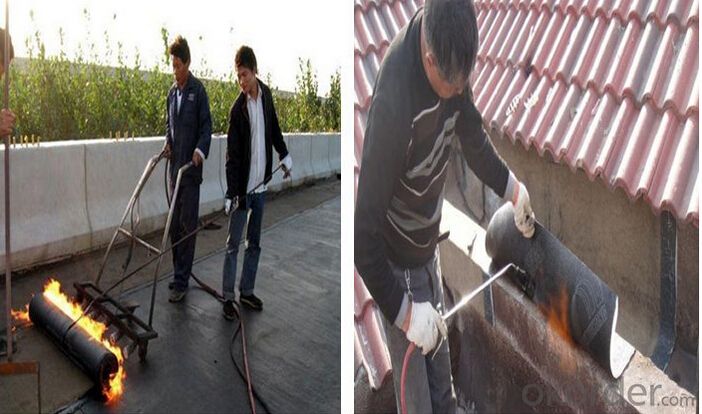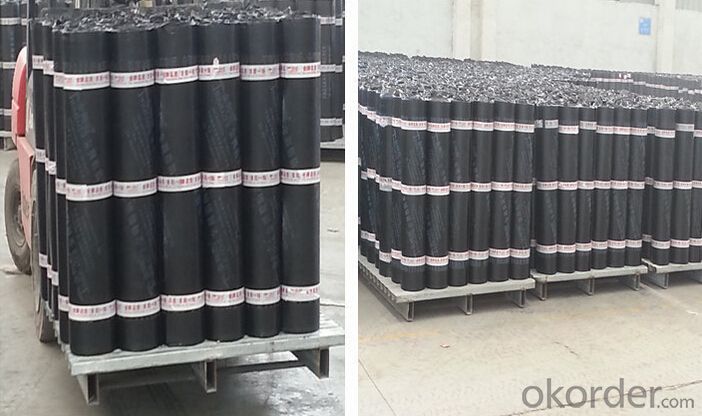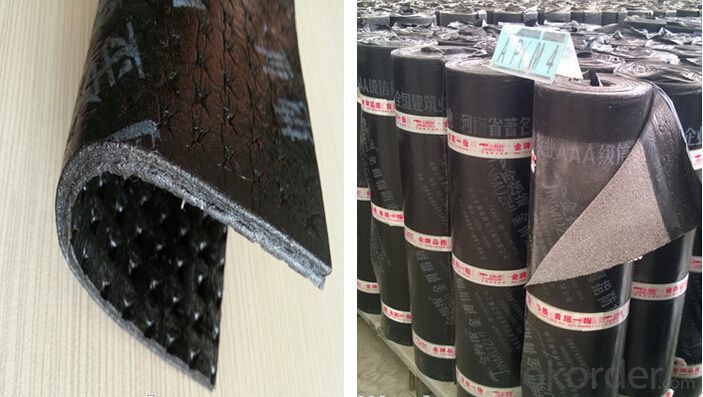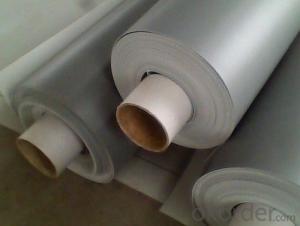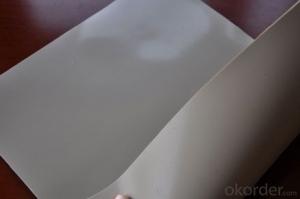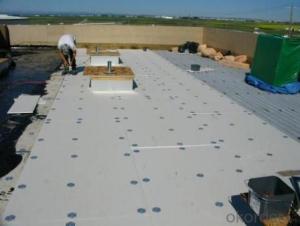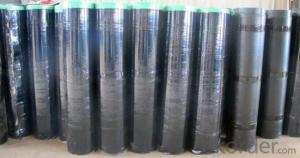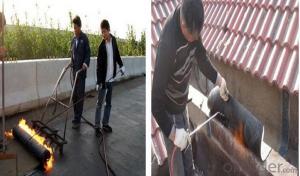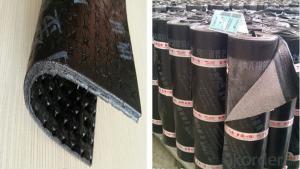APP/SBS Modified Bitumen Waterproof Membrane For Roof
- Loading Port:
- Shanghai
- Payment Terms:
- TT OR LC
- Min Order Qty:
- 1000 m²
- Supply Capability:
- 200000 m²/month
OKorder Service Pledge
OKorder Financial Service
You Might Also Like
CE approved waterproof membrane price , self adhesive textured roll sbs waterproof membrane
product description:
CE approved waterproof membrane price , self adhesive textured roll sbs waterproof membrane take the “Skin” type waterproof thought, according to the features of construction site, on the basis of width elastomeric modified bitumen waterproofing membrane, combining with features of wet-application self-adhesive membrane, use advanced equipment to produce 2 meters width that WP-SBS wet-application width elastomeric modified bitumen waterproofing membrane (Hereinafter referred to: WP-SBS membrane).WP-SBS is made of bitumen modified with Styrene-Butadiene- Styrene (SBS)as dipping and painting. Its upper surface covers PE membrane and color sand or schist, and lower surface is made of isolation material. Products correspond to the national standards GB18242-2008(elastomeric modified bitumen waterproofing membrane), paste by cement or cement mortar, and construct on the wet base, achieving tight and full adhesion with substrates, eliminating fluid-channeling layer, all above contribute to making a reliable “Skin” type waterproof system, which is a breakthrough innovation in ordinary modified bitumen membrane.
Technical parameter
| Item | Specifications | ||||||||
| Geotextile Unit Weight (g/m²) | 300 | 500 | 600 | 700 | 800 | 900 | 1000 | 1100 | |
| Geomembrane Thickness (mm) | 0.25-0.35 | 0.30-0.50 | |||||||
| Nominal Fracture Strength (KN/m) | 2.50 | 7.50 | 10 | 12 | 14 | 16 | 18 | 20 | |
| Breaking Strength (KN/m,≥,LD/TD) | 2.50 | 7.50 | 10 | 12 | 14 | 16 | 18 | 20 | |
| Standard Intensity Corresponding Elongation Rate (%) | 30~100 | ||||||||
| CBR Burst Strength (KN,≥) | 0.70 | 1.50 | 1.90 | 2.20 | 2.50 | 2.80 | 3.00 | 3.20 | |
| Longitudinal Tear Strength (KN,≥) | 0.05 | 0.25 | 0.32 | 0.40 | 0.48 | 0.56 | 0.62 | 0.70 | |
| Hydrostatic Pressve (Mpa) | See List Below | ||||||||
| Peel Strength (N/cm,≥) | 6 | ||||||||
| Vertical Permeability Coefficient (cm/s) | According to design or contract mentioned. | ||||||||
| Width Variation (%) | -1.00 | ||||||||
| Item | Geomembrane Thickness (mm) | ||||||||
| 0.20 | 0.30 | 0.40 | 0.50 | 0.60 | 0.70 | 0.80 | 1.00 | ||
| Hydrostatic Pressve (Mpa) | One geotextiles with one geomembrane | 0.40 | 0.50 | 0.60 | 0.80 | 1.00 | 1.20 | 1.40 | 1.60 |
| Two geotextiles with one geomembrane | 0.50 | 0.60 | 0.80 | 1.00 | 1.20 | 1.40 | 1.60 | 1.80 | |
Characteristic
1.Good impermeability
2.Possess good tensile strength, elongation and size stability which could be well suited the substrate distortion and crack.
3.Good performance in anti-strength, anti-resistance , anti-erosion, anti-mildew, anti-weathering
4.SBS modified bitumen membrane is specially being applied in the cold area with low temperature, while APP modified bitumen membrane is applied in the area with high temperature.
5.Convenient installation
Applicable scope:
It is widely used for civil building roofing, underground, bridge, parking, pool, tunnel in the line of waterproofing and dampproofing, especially for the building under high temperature.
Application method:
1.Make sure the roof deck smooth ,clean and dry(Moisture<9%),then apply the surface of roof deck homogeneously with a kind bitumen paint till dry to start application.
2.There are two methods in application:
One way is by heating and melting method---Heat the polyethylene film of the membrane and roof deck surface by heating and melting method to be nearly melted (not flowing),then install the membrane fully bonded to the roof deck with overlaps of 5-10cm.
The other way is by cold adhesive method---Pour the cold adhesive homogeneously on the roof deck then roll the membrane to install it to be fully sticked to roof deck.
By heating and melting method and by cold adhesive can be used in alternation in application as requested.
3.After application ,a full serious inspection is required to make sure no air bubble ,no fold,no falling away etc to guarantee the waterproof life.
Our Services
1.If you need some advises for the waterproof construction, we have the best engineer to serve you.
2.We send the free samples to you by freight collect.
3.We will guarantee the quality and the competitive price.
4.We will give you the best packaging and safe shipping.
5.If any problem, we will always be right here waiting for you.
Product usage of pe compound waterproof membrane
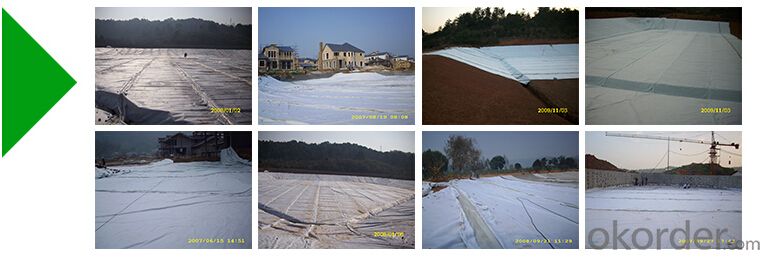
The products are widely used in projects of compound geomembrane impervious
Product line&test
♦Product line
From raw materials to finished products, every process is tested and controlled professionally and seriously by our professional machines and person.

Professional test machines ensure the products qualified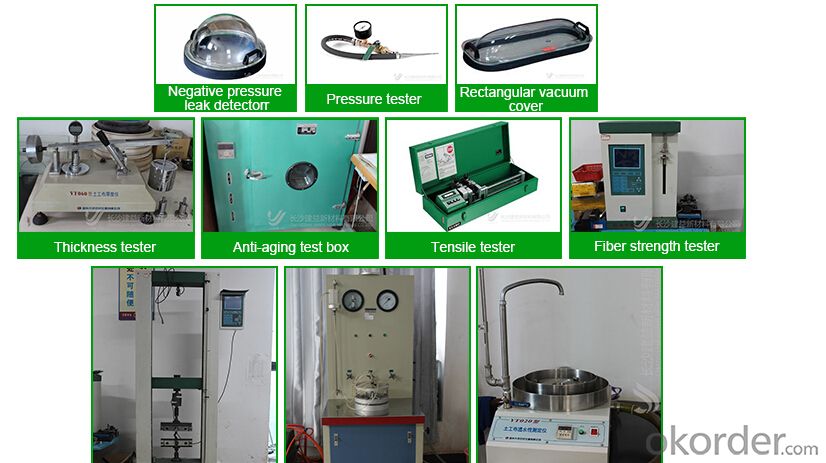 roduct certifications
roduct certifications
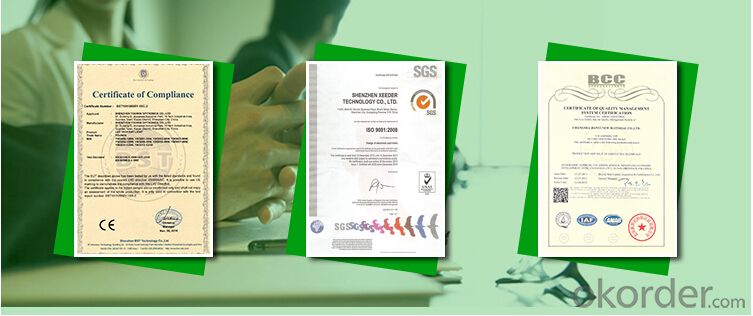
Inquiry Note
How to send an effective inquiry for saving your time?
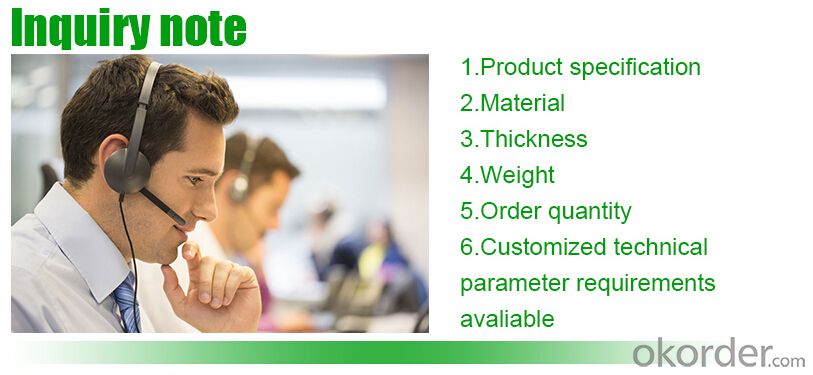

Packaging & Shipping
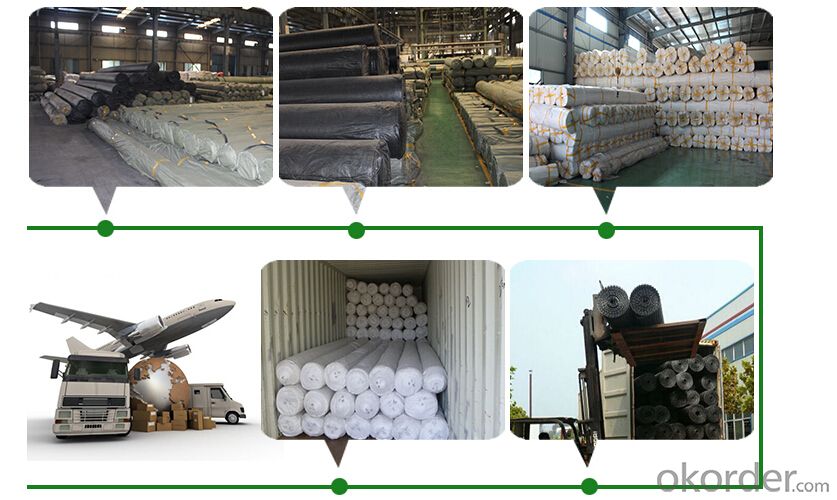
| Packing | Woven bag/PE bag packing or as customer request |
| Shipping | FOB Changsha,customized shipping terms and oppointed port accepted |
Why choose us ?
We have 20 years manufacturer experience
10000-30000 square meter factory size,more than 10 production lines
We will be your best partner,provide high quality products with CE,ISO,SGS
approved in competitive prive,sincerely hope to make a win-win cooperation with you.

FAQ

- Q: Can a waterproofing membrane prevent mold and mildew growth?
- Yes, a waterproofing membrane can help prevent mold and mildew growth. Mold and mildew thrive in damp and moist environments, and waterproofing membranes create a barrier that prevents water from seeping into the underlying surfaces. By keeping the area dry, the membrane reduces the conditions necessary for mold and mildew to grow. Additionally, some waterproofing membranes are designed with antimicrobial properties, which further inhibit the growth of mold and mildew. However, it is important to note that while a waterproofing membrane can help prevent mold and mildew growth, it is not a foolproof solution. Proper ventilation and maintenance are also crucial in preventing these issues.
- Q: Are waterproofing membranes resistant to thermal cycling?
- Yes, waterproofing membranes are generally resistant to thermal cycling. These membranes are designed to withstand changes in temperature without losing their effectiveness. Thermal cycling refers to the repeated expansion and contraction of materials due to temperature fluctuations. Waterproofing membranes are engineered to have excellent dimensional stability, which means they can expand and contract with minimal deformation. This resistance to thermal cycling ensures that the membranes maintain their integrity and prevent water penetration, even in extreme temperature conditions. However, it is important to note that the specific resistance to thermal cycling can vary depending on the type and quality of the waterproofing membrane used.
- Q: Can a waterproofing membrane be used on concrete?
- Yes, a waterproofing membrane can be used on concrete. In fact, it is a commonly used method to prevent water penetration and protect concrete structures from moisture damage. A waterproofing membrane is a thin layer of material that is applied on the surface of the concrete to create a barrier against water and moisture. It can be made from various materials such as bitumen, rubberized asphalt, polyurethane, or acrylic. The membrane is typically applied in liquid or sheet form and adheres to the concrete surface to form a continuous and impermeable coating. This coating prevents water from seeping into the concrete, which can cause degradation, cracks, and other forms of damage. Waterproofing membranes are widely used in various concrete applications, including basements, foundations, roofs, and other structures that are exposed to moisture or water.
- Q: Can a waterproofing membrane be used for a parking lot?
- Yes, a waterproofing membrane can be used for a parking lot. Waterproofing membranes are commonly used in parking lots to protect the underlying structure from water damage and extend its lifespan. They provide a barrier against water penetration and can help prevent cracks, deterioration, and corrosion caused by moisture. Additionally, a waterproofing membrane can also help to minimize the formation of potholes and other surface damage.
- Q: Can a waterproofing membrane be used for plaza decks?
- Plaza decks necessitate safeguarding against water infiltration to avoid harm to the underlying structure. This is where the application of a waterproofing membrane comes into play. These membranes are specifically designed to create a barrier, preventing water from permeating the deck and causing issues like leaks, deterioration, and structural damage. Typically composed of materials such as bitumen, rubber, or polyurethane, these membranes boast high resistance against water penetration. By incorporating a waterproofing membrane onto a plaza deck, it ensures the deck remains impervious to water, thereby preserving the integrity of the entire structure. Furthermore, these membranes offer additional advantages such as UV resistance, durability, and easy maintenance, rendering them an ideal solution for plaza decks.
- Q: Is a waterproofing membrane resistant to saltwater or salt damage?
- Typically, a waterproofing membrane resists saltwater or salt damage. Its purpose is to create a barrier against water and moisture, making it suitable for use in marine environments or coastal areas. These membranes are made from materials that can withstand the corrosive effects of saltwater or salt. To ensure their resistance to saltwater or salt damage, proper preparation and sealing techniques are employed during installation. However, it is important to note that the level of resistance may vary depending on the type and quality of the membrane. Therefore, it is advisable to consult with a professional or the manufacturer to choose the appropriate membrane for the specific application and environment.
- Q: Can a waterproofing membrane be used for walkways or pedestrian bridges?
- Yes, a waterproofing membrane can be used for walkways or pedestrian bridges. Waterproofing membranes are designed to protect surfaces from water infiltration and can be applied to various structures, including walkways and pedestrian bridges, to prevent water damage and ensure their longevity.
- Q: Can a waterproofing membrane be used in geotechnical applications?
- Yes, a waterproofing membrane can be used in geotechnical applications. Waterproofing membranes are commonly used to prevent the infiltration of water into structures and are applied to various surfaces such as roofs, basements, and foundations. In geotechnical applications, these membranes can be utilized to prevent water from seeping into soil, preventing erosion, and stabilizing slopes. They can be installed horizontally or vertically to create a barrier that prevents water penetration, which can be particularly useful in retaining walls, embankments, and dams. Additionally, waterproofing membranes can also be used to control the flow of water and improve drainage in geotechnical projects. Overall, the use of a waterproofing membrane in geotechnical applications can enhance the durability and performance of structures while protecting against water-related issues.
- Q: Can a waterproofing membrane be used on precast wood surfaces?
- Yes, a waterproofing membrane can be used on precast wood surfaces. Waterproofing membranes are commonly used to protect various types of surfaces, including wood, from water damage. These membranes are designed to create a barrier that prevents water from seeping through and causing structural issues or rot in the wood. By applying a waterproofing membrane to precast wood surfaces, you can effectively protect the wood from moisture and prolong its lifespan. However, it is important to ensure that the membrane is compatible with wood and follow the manufacturer's guidelines for application to achieve the best results.
- Q: Can a waterproofing membrane be used in crawl spaces?
- Crawl spaces, being susceptible to moisture and water intrusion, can suffer from issues like mold, mildew, and structural damage. For protection against water damage, using a waterproofing membrane is an effective solution. By installing the membrane on the walls and floor of the crawl space, it creates a barrier that keeps moisture out. This is especially useful in areas with high water table levels or frequent flooding. Moreover, the waterproofing membrane not only safeguards the crawl space but also enhances indoor air quality by inhibiting mold growth and reducing allergens. To determine the most suitable waterproofing membrane and installation method for a specific crawl space, it is advisable to seek professional advice as requirements may differ.
Send your message to us
APP/SBS Modified Bitumen Waterproof Membrane For Roof
- Loading Port:
- Shanghai
- Payment Terms:
- TT OR LC
- Min Order Qty:
- 1000 m²
- Supply Capability:
- 200000 m²/month
OKorder Service Pledge
OKorder Financial Service
Similar products
Hot products
Hot Searches
Related keywords
